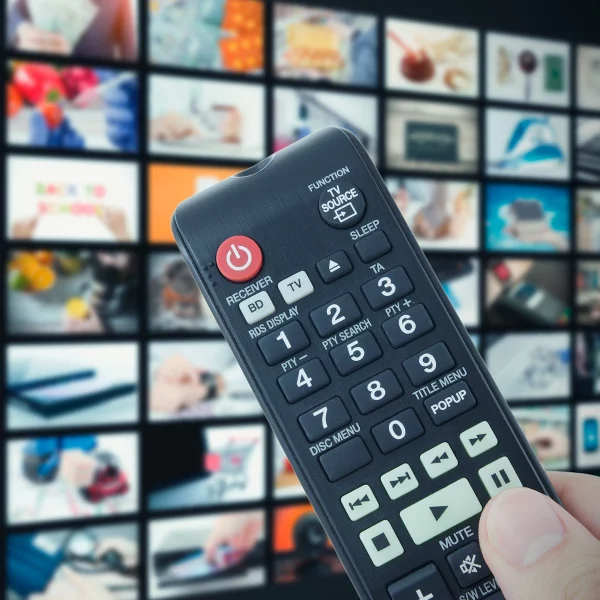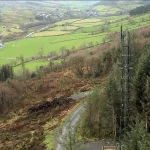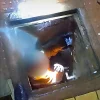Parliament Debates Broadband and the Future of Terrestrial UK Television

The topic of UK broadband coverage and the future of TV came up for debate in Parliament yesterday, which did a good job of highlighting the challenges. On the one hand, some MPs believe that the “switch-off of terrestrial TV in the 2030s is completely premature and unrealistic“, while the government warned that as terrestrial TV audiences fall, the cost of keeping it would eventually become unsustainable.
As most people will already be aware, there has been a radical shift in how the majority of us access and view TV content over the past decade or so. Such content is now increasingly being viewed online, via services like iPlayer, Netflix, Amazon (Prime Video), NOW TV, Sky Glass, Virgin Media (Stream Box), YouTube and so forth. Due to this, there has been a decline in those using traditional Digital Terrestrial TV (DTT) signals.
The past and present governments have thus been considering how to adapt to this (here), what to do about the TV licence fee, BBC and how to handle the related UHF bands (here) – those that help to carry Digital Terrestrial TV (DTT / DTTV) services (470-694MHz) – after the service has eventually been switched off. So far there’s been plenty of debate, but the most difficult decisions have yet to be made.
Advertisement
As it stands, the licences that support DTTV are due to expire in 2034 and past that point it may become too costly to sustain the service, with most users being expected to have ditched TV aerials in favour of IP (internet) based platforms and services.
The debate itself (here), which was raised by Conservative MP David Mundell, opened by calling on the government to “give certainty for the [DTTV] service into the 2040s” in order to support those who may not be able to access it via alternative methods, due to issues of cost, coverage and other reasons.
David Mundell MP said:
“Freeview is a universal service reaching 98.5% of the UK population, including those in remote and rural areas. It is available at no additional cost over and above the licence fee. This is a crucial point: people do not need to pay any additional monthly bills to watch terrestrial TV; all they need is a TV set and an aerial.
The options for watching TV have broadened in the last few years, with the arrival of TV streaming over the internet, or IPTV, as it is known. Many of us enjoy those services, but the fact is that to do so, someone needs a high-speed fixed broadband subscription of sufficient speed and reliability, and not everyone has that.
…
Terrestrial TV has a reliability of close to 99%, which broadband does not. Almost half — 45.1% — of broadband customers experienced an outage lasting more than 48 hours in the past year. Indeed, Biggar and the surrounding communities in my constituency experienced an outage of 36 hours. Even as high-speed coverage increases through initiatives such as Project Gigabit, take-up is entirely a different matter.
…
Research from the consultancy EY estimates that by 2040, some 5.5 million premises will not have taken up a high-speed fixed broadband subscription. Today, some people cannot access fixed broadband because the signal where they live is not fast or reliable enough. Other people simply cannot afford to pay for fixed broadband subscriptions on top of other bills. Millions of people are relying exclusively on mobile for access to the internet. Indeed, data from Citizens Advice suggested that, in 2022 alone, up to 1 million people cancelled their broadband subscription because of the high cost of living.
…
That is really my message today — any talk about a switch-off of terrestrial TV in the 2030s is completely premature and unrealistic. The Government have the opportunity to take that possibility off the table and give certainty for the service into the 2040s.”
Firstly, we’re not entirely sure where the MP got that 45.1% statistic from for outages lasting more than 48 hours, as this seems unlikely to be correct from our own observations of the market. The majority of common outages that do occur typically only last for a few minutes to a few short hours, with anything longer being a very rare occurrence indeed. Equally, sometimes the problem can be within your own home network, so take it with a pinch of salt.
However, the former culture secretary, Sir John Whittingdale MP (Conservative), warned that “moving purely to IPTV is, I think, inevitable” (we’d tend to agree) and spoke of how he personally thought that the date that has been set as a guarantee for DTT continuing — 2034 — “is about right“. Both Ofcom and broadcasters have previously warned that there will come a tipping point where it’s no longer economically viable to continue to maintain DTT.
Advertisement
Whittingdale also pointed out that there would be some benefits to a switch-off, aside from the direct cost savings, such as by allowing the possibility of using existing DTT spectrum for other purposes (e.g. if auctioned off to mobile operators, the IMT600 band could theoretically raise up to £980m and help to improve network coverage).
Sir John Whittingdale MP said:
“The other reason why I think a switch-off is worth considering is the future of the BBC. Fewer and fewer people each year choose to pay the licence fee, and we need to look at alternatives. Lots of people say, “Well, in that case, why can’t we just operate like Netflix or Amazon and charge people?” The reason is that the BBC cannot, unless it has streamed services with conditional access that allows people to choose not to receive it. That is also an important part of the debate.
My right hon. Friend is absolutely right that there are real challenges. The cost has already been referred to. In government, I had responsibility for Project Gigabit—the Minister will be all too familiar with that—and the initiative to extend gigabit broadband coverage across the country. We still have some way to go. It would be unthinkable to turn off DTT before we reach the point at which gigabit broadband is universal.”
The government’s representative, Stephanie Peacock MP (Parliamentary Under-Secretary of State for Culture), responded to all this by acknowledging both the significant shift in viewers to “internet-based platforms“, the high cost of trying to maintain DTT past 2034 and the importance of “not [losing] sight of those who still rely on digital terrestrial television as their main way of watching TV … especially true for people without access to fast, reliable broadband“.
Stephanie Peacock MP (Government) said:
“I would like to directly address the issue put to me by the right hon. Member for Dumfriesshire, Clydesdale and Tweeddale and others of why the Government do not simply commit to extending the licences past 2034. The cost of DTT to the PSBs is substantial. As fewer people rely on DTT, the cost per house is going up and will continue to do so.
I am aware from my visits and meetings with providers that as part of the network reaches the end of life, investment would be needed to carry on even the current services. The right hon. Member for Maldon (Sir John Whittingdale), a former media Minister, referred to that tipping point. I say that while very clearly saying that no decisions have been made; these are complex issues.
…
Around 4.5 million households still face real barriers to accessing TV over the internet, whether due to a lack of broadband, unconnected TVs, or a preference for traditional linear viewing. To understand those challenges, we commissioned researchers who spoke directly with a representative range of viewers across demographic groups, from DTT-only users to hybrid users, who use both DTT and IPTV, and full internet TV adopters.
Building on the University of Exeter’s research, this in-depth work shows that many are interested in IPTV once they understand it better, but concerns remain about cost, internet reliability and technical confidence, even among those with broadband. We are using those insights to understand how different groups are affected and to explore what the Government and industry can do to support fair and inclusive access to television.
…
We also know this is not an easy decision. The choices ahead are complex and must be guided by evidence, and that is why we are taking the time to get them right, drawing on data, research and the views of people across the sector and across the country. We know this work cannot happen in isolation; it is a joint effort that requires extensive collaboration across Government, industry and audience groups
The debate doesn’t really say anything new, but it does summarise the current thinking in parliament and shows that all sides do seem to be trying to find a solution that works. The inevitable reality here is that the days of DTT are slowly coming to an end and nobody should seriously expect it to be continued, at least not at full national scale, much past 2034. But the form of that solution remains unclear.
Equally, there seems to be a strong focus on the need for gigabit broadband to achieve its near universal coverage target first (currently set for 2032, which marks a recent delay from the original 2030 target). But it’s worth remembering that you don’t need gigabit download speeds to watch several HD TV content streams live online (some 98% of the UK can already access speeds of 30Mbps+).
Advertisement
Even the relatively new Freely TV streaming service (eventually this may replace Freeview, even if it’s not promoted like that) states that supporting TVs and other devices require a “minimum broadband speed of 10Mbps” to “stream live internet channels or watch on demand shows“. In reality, you can already fit a single 1080p (Full HD) video stream down a stable download rate of 2Mbps+ with modern codecs, and future developments may even squeeze this down to 0.5Mbps.
The catch being that we still have to allow overhead, particularly in family homes, for people to be using their broadband connection – reliably – for other tasks than just streaming TV/video content (even though that does account for the vast majority of consumer data traffic). Nevertheless, it’s not a negative that the government may wish to achieve universal gigabit coverage before culling DTT, particularly as modern FTTP lines are much more stable and reliable than older copper-based solutions with their many caveats.
Mark is a professional technology writer, IT consultant and computer engineer from Dorset (England), he also founded ISPreview in 1999 and enjoys analysing the latest telecoms and broadband developments. Find me on X (Twitter), Mastodon, Facebook, BlueSky, Threads.net and Linkedin.
« SMARTY Finally Introduce eSIM Support to UK Mobile Network






















































“Almost half — 45.1% — of broadband customers experienced an outage lasting more than 48 hours in the past year.”.
Is that true?
Across a full year, most people will see some broadband disruptions (the chances are good you won’t notice most of them), although these usually only last a few minutes to a few short hours and are rare. Some may also be related to issues within the home (not your ISP) or network maintenance. I’m not sure where that 45.1% statistic has come from, but it seems unlikely to be an accurate reflection of broadband stability. I’ve not seen any solid evidence to confirm otherwise.
I would suggest that outages are more likely on legacy copper networks than FTTP anyway. Looking at the logs for my BT hybrid connect, apart from the fact it hasn’t happened for more than a year now the three outage events logged in the last 2 years all occurred overnight which suggests to me it was planned maintenance on the network.
FANNY_VERIFY: You can get a break in fibre anywhere – local or down the road or any other type of failure like router firmware bugs introduced, or router stop working. External 3rd party contractors and all that.
In comparison, whilst you can have bad coax and aerial blown off course; if these are properly done you generally have far less faults as the terrestrial network itself is pretty stable and resilient with good/normal received signal (bar a transmitter crashing to the ground like Bilsdale which is an extremely rare event for TV).
If you lose internet, under IP, you lose TV as well. Mobile networks currently cant cope if everyone is IP for TV, and customers used backup from that in event of landline outage in an area. It’s OK if just one house that has an issue.
The majority of North American and Japanese homes just to take one example receive their TV via fibre and/or hybrid fibre-coax. Neither market famed for being tolerant of outages. With our networks carrying TV and phone it’ll incentivise faster repair much as it does elsewhere.
Might be accumulated downtime. Since switching to Zen/CityFibre just over a year ago there’s been two long lasting incidents (several hours) I can remember one with broken DNS just recently and one with ‘core routing’ or some such. Previously with Virgin HFC there would be lengthy downtime every other month – Virgin never you tell you why or even acknowledge there’s a problem, of course.
I’ve checked my sky router and it’s been up for 143 days. IIRC it didn’t go down for an outage but a reset for our hive that is a pia. We moved back to sky after being with virgin for 6 years (moved away from fttc). Whilst we were with virgin, I remember only 2 outages across those 6 years.
The two biggest issues I have with IPTV/Streaming is that being tied to the internet does have issues e.g. if it goes down, if I want to do maintenance e.g. firmware upgrades and the lack of a local DVR in most cases as of now.
At least with Sky Q, Virgin Coax and Freeview I can do what I need with minimal issues to others.
Do it when people aren’t watching same as you would when they aren’t actively using Internet. For many of us there are family at home that need working around for maintenance
A bunch of Virgin Media channels really on the broadband too.
@Polish Poler
Problem is finding such a time when I don’t have to worry about others, also taking into account potential issues that can happen e.g. failed updates.
It also doesn’t help that my parents are retired for when I’m doing stuff at their house.
Bearing in mind that in 2010 they were slating shutting down the national FM radio transmitters as early as 2015 in favour of DAB and 15 years later FM is still very much with us, my best guess is that DTTV will be with us for some time yet and is more likely to die the death of a thousand cuts than a mass shutdown. I would expect the commercial multiplexes to disappear first (who actually watches the shopping channels anyway?) and eventually more of the top end the spectrum to be sliced off with TV left occupying Group A (channels 21-34). Probably the BBC A & D£&4 multiplexes converted to DVB-T2 and public service broadcast channels only to be broadcast in HD (as has already happened with satellite). Freely so far has done a pretty lousy job of making their services available, if an STB is forthcoming then it will need to be under £50 to attract attention.
The broadcasters will likely strip the HD multiplex and leave just the SD versions and the commercial multiplexes will start to reduce offerings.
This is how they will try to “kettle” people down a specific route. All the broadcasters do not want the cost of sat or DTT because the Streamers don’t have to bear that cost in their operation.
The streamers are backed by likes of large corporates and they came in and rove production prices through the roof for traditional broadcasters, because they had the budgets and needed to show headline figures etc to get market share. They wanted to through money thinking it will result in a great programme everyone will watch. In reality, the existing broadcasters know that some of the successes have been on the lowest budgets as it is about cast and story in most cases….
I’m worried because my HDD VCR only records broadcast, not streaming, so I will lose that. I realize BBC don’t want to pump money into expensive transmission power, ‘cos we pay for broadband, not them spaffing it all over the country! But the the ability to record a program to HDD, copy it to BRD, and watch it for years to come will be lost. Of course BBC wins (!o transmission costs), Streamers win (repeat viewings) but consumers lose (as always). Someone please think of the Little guy.
Couldn’t agree more regards price of freely streamer i have ee tv package and have just purchased from Ebay a brand new unboxed ee tv box mini for £25 and that includes delivery.
Yes, the streams will be locked heavily in DRM and using hardware based certs so trying to capture as an original stream will probably not doable, and the won’t expose the live streams via a web browser anyway, unless it is a downgraded copy like SD or 720p.
You won’t be able to record, which the rights holders have wanted. The reply will be to use catch up services if available. We all know that 5.1 sound is not on the catch up services from Terrestrial and iPlayer has an on screen logo whereas BBC1 and BBC2 does not.
So, yes, end consumer loses again.
This is a tricky one because the costs of maintaining the transmission network and putting the DVB hardware in each TV is not insignificant, but it does have value in the event of a widespread internet disruption. Our ability to get information out shouldn’t be wholly reliant on working IP networks, though the cost of that probably wants to be something picked up by central government rather than put on broadcasters who have no interest in anything other than IPTV.
In every horror film when the world is ending from a natural disaster, or a plague of Zombies are hitting the town, people always put on the radio for updates about it. I don’t think we need TVs for this. Radio is good enough.
When FTTP is forced onto everyone, and vDSL becomes a thing of the past like Dial-up did before it, which from what I understand is due to occur by December 2026? Having terrestrial TV is worthless and can be switched to all IPTV. Everyone can be given a free Roku stick to upgrade old TVs (similar to what did in 1999 with the Digital switchover to upgrade old TVs to digital by giving people a freeview box). And then BBC can offer free channels and paid for channels. People can then get rid of chimneys on houses which right now are only good for holding TV aerials.
“People can then get rid of chimneys on houses which right now are only good for holding TV aerials.”
FANNY_VERIFY: Chimneys are used by people in rural communities, particularly where online gas is not available and power cuts to Electricity can happen in bad weather or just overload of the network. It enables an efficient stove with correct fuel (dry wood) to keep them warm in winter and from freezing to death.
Chimneys are also part of older housing stock which gives character, and potentially that building may be protected by Grade Listing.
BBC can provide free and not free channels – Someone has to pay the “FREE” bit, and what happens to BBC/CH4/CH5 and other commercial Sky broadcasters if BBC take the advertising revenue?
BBC 1 + BBC 2 on Terrestrial have no on screen logos. The Freely equivalents have on screen logos. Perhaps viewers do not want pollution on their (expensive) OLED screens and prefer terrestrial PLUS the issue of FTTP reliability and time to fix faults. The main transmitters used for Freeview are pretty resilient in comparison.
No. The end of 2026 is closure of the PSTN, the telephone network. It has nothing to do with FTTP.
That won’t work for everyone though as not everyone has an internet connection and may be ‘vulnerable’ to a point that the Roku is ‘too complex’.
The most practical alternative I can think of would be to provide ‘free’ internet, even if it’s locked down and ideally have a box that can replicate Freeview in terms of simplicity, at least for existing sets.
As for who would pay for this, I could see it either being the license fee (if it still exists), the broadcasters themselves, from central government or a Broadband tax of some kind. Bearing in mind the above includes those exempt from the license fee as of now, so any broadband costs will be new to them and likely unpopular.
You don’t necessarily need a chimney for a TV aerial anyway. We’re in a good reception area and our aerial works perfectly well in our loft, in fact it’s so strong I had to fit an attenuator to stop it overloading the input to the TV.
Most new homes do not have chimneys. Probably cuts costs a bit and few people how use them
Newer TVs now that come with Freely do not seem to have an aerial backup (Freeview or alternative). If I had to replace I really would like a belt and braces approach in this possibly long transitional period but that is not what the sellers want to offer us.
FANNY_VERIFY: The Freely TVs come with aerial (for now) as not all channels are on Freely. If your TV is connected to the internet when tuning however, the TV will decide to use the IP version of the channel by default rather than the terrestrial transmitted channel. As more services are added to Freely, the existing method of terrestrial can be switched over to IP per channel.
I had a quick look, the Freely models I looked at still seem to have an antenna socket but they don’t advertise it.
I would advise checking before buying though and I won’t be surprised to see antenna/sat support dropped similar to SCART.
@tech3475, not for a long time and also it is only the budget companies that are supporting Freely, so Vestal made sets, TCL and Hisense.
As far as I know, Sony and Samsung have not got on board.
I am not saying that is anything wrong with cheaper sets, I have a Hisense and it is a great set, just some people like sets make by Sony and Samsung.
Scart vanished because devices using scart vanished.
@Ad47uk
I was talking specifically about Freely supported TVs, one of the earliest TVs I saw which dropped having an analogue tuner was a budget model (Bush) although ironically budget TVs seem to keep SCART longer than brands like Samsung. So I do think that you should check before making any purchase.
SCART still isn’t completely dead, albeit from my experience mostly DVD players and adapters, not including Retro stuff.
@tech3475, ah, you did not type analogue, you typed Ant/sat. My Hisense Roku don’t have an analogue tuner, if it does then it is not available. It does have video in, but only composite.
Analogue tuners will vanish, but digital ones will still be with us for years.
We will wait and see, while they did eventually change from analogue to digital terrestrial, they have not done the same thing with radio, which we were told was going to happen. I am glad to be honest, FM is far better than DAB rubbish. If I listen to digital only stations like Boomm, I use my echo units, I also have a Echo input which is connected to my hi-fi. Echo with no speaker, great idea, just a shame Amazon decided to stop producing it.
@Ad47uk
In my first post I was talking about the antenna socket (ala Freeview).
In my response I mention analogue because I was talking about a TV which had dropped the analogue tuner in favour of Digital/Freeview only.
My point being, don’t make assumptions when buying a TV and always double check the features. You may find yourself unlucky and buy a TV assuming it will have Freeview but they’ve dropped it, could be years from now but I won’t be surprised to see it some day.
@tech3475, there is no TV on the market in the U.K without an aerial input as there would be little call for it at the moment, if someone wanted to have a RTV with no tuner, they could buy a monitor and then get a Roku or firestick.
I did think of that to be honest, have no need for a tuner, but the price of a large monitor is over the top. That is, if you can get one. Samsung makes a 55 inch one, that cost way over a grand and is curved, so bet for me to buy6 a Hisense and not tune it in.
Maybe in 10 years or more, there will be some sets without a tuner, depends how well this Freely does and if it catches on.
As far as i am aware there are very few new sets that have analogue tuners these days, no real call for it
You can get a social broadband tariff for about the same price as the licence fee. No licence fee is needed to watch the vast amount of non-BBC on-demand content available for free – not to mention all the other benefits of having an internet connection. So I don’t think David Mundell’s argument on cost adds up, people would be much better off ditching the licence fee and getting a cheap broadband connection instead.
But they do add up, Not everyone can get social broadband tariff for a start and maybe they don’t want to muck around with holes being drilled through the walls for fibre and extra boxes to get TV.
My brother is retired, but he can’t get social tariffs, in fact he is considering scrapping broadband and just maybe using his phone to tether his tablet/laptop.
I try to get him to use the streaming side of his TV, but he won’t.
Doesn’t work for everyone though, my grandmother for example doesn’t want broadband, watches the BBC, doesn’t pay for the license fee and refuses to use anything more advanced than channels 1-5, even when it’s to everyone’s detriment.
I agree with David Mundell, well kind of, me agreeing with a politician is not something that happens very often. I say kind of because I don’t agree with the broadband outage part, it is far more reliable than it used to be, even Openbreach hybrid fibre service. Maybe in the ADSL days we had lots of problems. Saying that my provider had an outage yesterday, the first one for over two years, that affected me. So it does happen.
That is where the problem is, as David Mundell, Freeview is pretty reliable, rubbish, but reliable, the majority with a TV, electric and an Aerial can receive channels without any other costs apart from the BBC tax.
Get rid of Freeview and people who don’t have any broadband or don’t want broadband are stuffed. I know a few people who don’t have broadband at home, they either rely on their phones and not bother at all and they are not all old people either, a couple are in late 30’s, and they don’t see the need for broadband.
I don’t bother with Freeview or any linier TV, I don’t have a TV licence. I do stream stuff, a lot of ITV X stuff at the moment. So freeview going makes no odds to me, but then I will be a old man by the time it does, if it does by 2035, if I am around then
Perhaps, if Ofcom are to auction the spectrum to MNOs, that spectrum should come with the stipulation that they must offer zero-rated access to whatever the Freeview replacement is to be. TVs could then incorporate a cheap low speed 4G LTE modem to receive this via a TV data-only eSIM, roaming across all participating networks. There is a multicast-based system designed for just this (eMBMS) but I suspect that would be costly to implement.
Now, MNOs aren’t going to want a load of radio bandwidth consumed by hundreds of TVs streaming. This could be helped by saying TVs will only receive, say, fairly low bandwidth HEVC @ 720p over this connection so users are encouraged to connect the TV to Ethernet/WiFi and only use the mobile network as a fallback.
As an aside, I do hope Freeview is replaced by a similarly open system (standards-based, open to all, DRM-free). Such a public service is hard to come across these days, but I fear it will be used as an excuse to lock it behind some kind of barrier.
Anything that abolishes the license fee and limits Ofcom to only regulating technical aspects of ISPs and spectrum is fine in my book. Everything else, burn it all.
The BT Smart Hub 2 reboots roughly every 14 days, not really an outage off course, thought somebody would have mentioned this before now, plenty of BT customers talk/complain about it!
Is there not a way to stop that? Years ago when I was with BT, in the ADSL days, the router with the phone on, I am pretty sure there was an option in it to stop that happening.
I suppose it happens to update, but why on earth does it need updating every 14 days? This is a what I mean about BT hubs, full of bloat, so much of it that they have to get rid of bugs.
I am glad I use my own router and not my providers, I don’t know if they update theirs, I presume they do, but I have control over mine, I check it ever few months to see if there is an update. The last update did not go so well, it works okay, but the UI looks strange in dark mode, have to put the browser in light mode :).
Still, how often do people go into the setting of their routers? I did a few days ago, I was renaming all my devices and I could not remember the SSID for my IOT network
In my case, the SmartHub2 restarted with the same two weeks or so interval after the initial installation, but as of this morning, for instance, the uptime is 100 days.
In my case, the Smart Hub2 restarted with the same two weeks or so interval after the initial installation, but as of this morning, for instance, the uptime is 100 days.
@Ad47uk:
It was the operational policy that was scheduling the restarts.
@Ad47uk: No there is no way to stop this happening in the router settings, other BT routers have the same issue, some customers have even taken this problem to the ombudsman man, believe it or not, without success I should add!
@Far2329Light, makes me glad i have not used BT for years, I used Plusnet, but their router never done it, but then, for some time i was with Plusnet, I had a Zyzel router supplied by then and towards the end of my time I used my own
@ Ad47uk:
If you have a hub supplied by your provider, then it will most likely include a remote management function. This will be used to optimise the connection. It is less likely to be used in the case of FTTP connections.
@Far2329Light, the Zyxel I had from Plusnet certainly did not have remote management, but some features were locked, like the VoIP, sadly. The router I had before was managed, looked like one of the BT hubs, but in white and without the bloat that BT stuffs in theirs.
Zzoomm’s routers are managed, thankfully it is easy enough to use my own, the same with plusnet.
Updates I don’t mind to a certain degree, it is the locking I don’t like
@Ad47uk: The PlusNet Zyxel Hub had TR-069 enabled and it was most likely used by the provider.
Point:
It is claimed in the debate that Freeview can reach 98.5pc of the UK population. Ofcom is projecting that 99pc of UK properties will have access to an adequate connections by 2032. Given that the figures are comparable, and within the suggested timescales for the shutdown of DTT is perhaps best if Parliament stayed out of the matter and instead let market forces drive the transition.
@Far2329Light: Have a look at the comments on the BT community regarding this issue. Some used to blame this on the DLM, but still happens with Full Fibre. The bigger problem now is when the Digital Voice disconnects when the router reboots, no problem off course if it happens in the middle of the night. The strange thing about this is not everbody is affected, or like yourself stops rebooting after a period of time.
There are a number of reasons why the hub might require a remote restart.
P.S.
I do not place much reliance at all on the comments posted on BT forums, given that so many just want to moan without taking too close a look at the facts.
Keeping two networks going is not viable. The old terrestrial TV network is also very old and close to end of life and getting spares for it is increasingly difficult
Yes an IP network can go down but so does the terrestrial network
By the time the terrestrial network is shut down 99% of the population will have access to an IP network which is as high as have access to terrestrials TV
Those concerned as to what happens if the IP network goes down can get a radio as back up
You can’t watch TV on radio.
Still it is a fair few years away, not worth worrying about it at the moment.
A lot of the terrestrial TV network was updated when we went digital, okay, so it is still over 25 years old. The towers and masts are old, but they would still be kept anyway, well a lot of them for other things. Radio antennas, mobile phone antennas, emergency radio antennas.
As I have said above, need all TV manufactures on board and so far that have not happened, also need to improve Freely or what ever it becomes, because at the moment it is not great.
Freely has nothing to do with the closure of terrestrial. Terrestrial as well only carries BBC and ITV
As the analogue phone network is being switched off everyone will have to move to Broadband so the question of what happens to those without it does not really arise
they might technically have a broadband line, but they might not have capital-B Broadband.
For example, Openreach offers a 512 *kilo*bit product on FTTC and FTTP at quite a considerable cost saving over the 40Mbit product. One potential use case would be for situations where the customer does not want an internet connection, but something is needed to supply “Digital Voice” or equivalent VoIP service.
So they could get a 512k service and a router with all ethernet/wifi interfaces disabled and its job done. Added benefit of saving a couple of watts and thus increasing run time on any supplied battery backup units as well.
Assuming the broadband is reliable. Three times in the fast 5 years a pole carrying the fibre has been brought down, taking 3 to 4 weeks for Openreach to get round to fixing. It’s bad enough losing Internet and phone, adding TV to that is not a desirable prospect